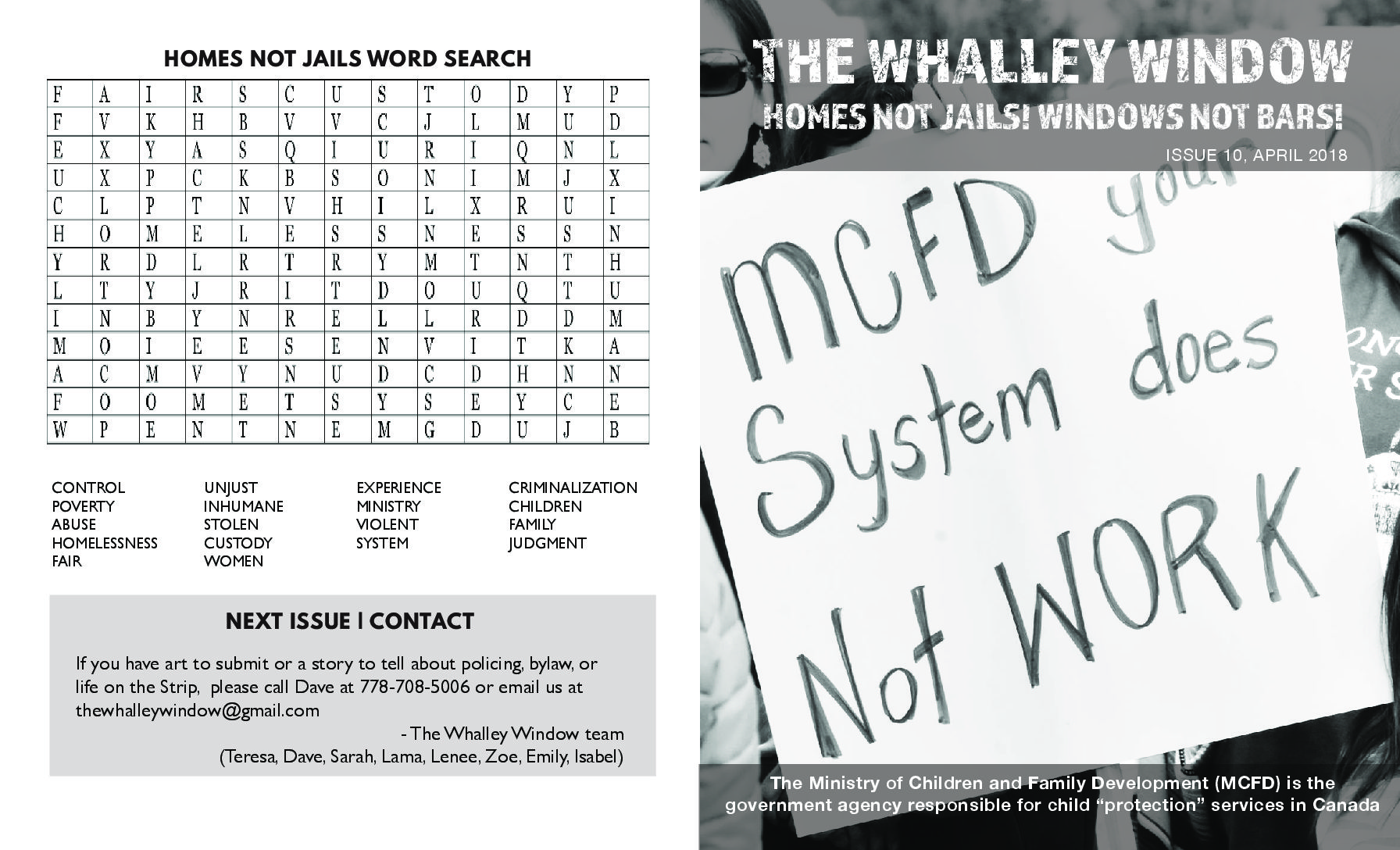
Download the PDF of The Whalley Window – Issue 10.
AN INTERVIEW WITH LAURA-LIN ON POLICING POVERTY
Poor and Indigenous people are surveilled, controlled, and punished by the Canadian state. Not only are we policed by pigs in uniform, but our lives are also controlled by social agencies – like the Ministry of Children and Family Development (MCFD) – which represent “soft” forms of policing and criminalization. There are more Indigenous children in care today than at the height of residential schools. Once kids “age out” of the system at 18, many are left with little support and are therefore vulnerable to homelessness and abuse. The following interview with Laura-Lin showcases the implications of this violent system; at the same time, her strength and resilience despite it all offers hope for a different future.
The following is an edited excerpt from an interview with a former resident of the Surrey Strip, Laura-Lin, by the Whalley Window team.
WHALLEY WINDOW: We’re interested in hearing about women’s experiences with the Ministry of Children and Family Development. So often it seems like the the system punishes you and doesn’t help you with your children.
Laura-Lin: I didn’t even get a chance with my kids. I gave my kids to my mom because I thought I was doing what was best for them. At that time, their dad put a hole in my window. It was that really, really dry winter we had when nobody could breathe or anything – in 2010, I think – and my landlord went to India for three months. So, I had to give my kids to my mom because it was too cold – I couldn’t have the kids in the house. My hot water tank blew up, I had no hot water, no heat, a hole in my window, you know?
Was there any effort made to reconnect you with your children?
I never, never, never lost touch with my kids. Never. I always stayed in contact with them. Every birthday, Christmas, Easter. I’ve never once just walked out of their lives.
First of all, that’s amazing. Did the Ministry ever try to see if it was possible for you to have them back? Or if you wanted them back?
Of course I wanted them [but the Ministry] wouldn’t call me back. I left messages with the Ministry for years. For year and years and years. I got no phone call. That’s not fair. Even the foster mom said, I don’t know why they’re doing this to you. I didn’t get a chance.
What happened to them, the kids?
They’re with the same foster mom still. She has primary residence and custody. But she’s all the way in Calgary. In that area, I didn’t have any say. I didn’t have a vote.
Why is that – why didn’t they give you a say?
Because I don’t have a house. I can’t afford a house on normal income assistance.
Really, it was because of poverty that meant there was no chance of you having the kids.
Yeah. One of the workers even said to me and my mom right to our faces as she laughed, “I’ll make sure that Laura-Lin never has these children” [as though] I was a horrible person. How am I horrible? These workers, they don’t get it. Nobody wanted to listen to me. Nobody gave me a shot. What did I do wrong? Nothing. It’s not fair because my kids lost out. And I beat myself up everyday because of it. Everyday.
That’s tough. You clearly care about your kids.
I do. They are what keeps me going. But it’s also eating me alive. It’s killing me.
Do you feel like a lack of housing contributes to your depression?
Yeah, it does. Because the home is where the heart is, right? When you have a home, you feel comfortable and you feel good about yourself. Then you want to work towards something. Without that, there’s nothing.
